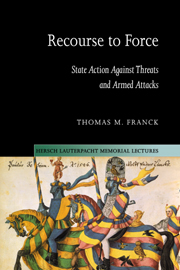Book contents
- Frontmatter
- Contents
- Acknowledgments
- 1 The United Nations' capacity for adapting to radical changes of circumstance
- 2 Use of force by the United Nations
- 3 The original parameters of self-defense
- 4 Self-defence against state-sponsored terrorists and infiltrators
- 5 Self-defense against ideological subversion
- 6 Self-defense against attacks on citizens abroad
- 7 Anticipatory self-defense
- 8 Countermeasures and self-help
- 9 The “purely humanitarian” intervention
- 10 What, eat the cabin boy? Uses of force that are illegal but justifiable
- Index
10 - What, eat the cabin boy? Uses of force that are illegal but justifiable
Published online by Cambridge University Press: 17 July 2009
- Frontmatter
- Contents
- Acknowledgments
- 1 The United Nations' capacity for adapting to radical changes of circumstance
- 2 Use of force by the United Nations
- 3 The original parameters of self-defense
- 4 Self-defence against state-sponsored terrorists and infiltrators
- 5 Self-defense against ideological subversion
- 6 Self-defense against attacks on citizens abroad
- 7 Anticipatory self-defense
- 8 Countermeasures and self-help
- 9 The “purely humanitarian” intervention
- 10 What, eat the cabin boy? Uses of force that are illegal but justifiable
- Index
Summary
The letter killeth, but the spirit giveth life.
St. Paul, 2 Corinth. 3:6Law that said what was necessary should not be done would seem an ass.
A.W. Brian Simpson, Cannibalism and the Common Law, p. 216 (1984)When does a state's recourse to force violate its legal obligations under the UN Charter? Does the answer lie exclusively with the black-letter text of Article 2(4), or is the practice of UN organs and of the constituent states also relevant?
In its judgment in the Nicaragua case, the World Court set out its view on the interaction between practice and the legal norm pertaining to armed intervention:
The significance for the Court of cases of State conduct prima facie inconsistent with the principle of non-intervention lies in the nature of the ground offered as justification. Reliance by a State on a novel right or an unprecedented exception to the principle might, if shared in principle by other States, tend towards modification of customary international law.
True, practice cannot by itself amend a treaty, but, as the Court has also pointed out, the practice of a UN organ may be seen to interpret the text and thereby to shape our understanding of it. Persons other than lawyers may, however, be forgiven for thinking this a distinction without much difference. Whether its effect is characterized as modification or interpretation of text, practice matters.
This is particularly so when strict construction of treaty text leads to a reductio ad absurdum.
- Type
- Chapter
- Information
- Recourse to ForceState Action against Threats and Armed Attacks, pp. 174 - 191Publisher: Cambridge University PressPrint publication year: 2002



